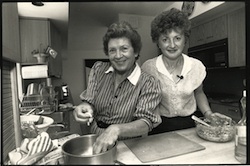Rachel Amado Bortnick didn’t suffer through pogroms. She didn’t escape her home country as government troops closed in on her town. She didn’t have to leave everything behind — her family, her cherished treasures — to make her way to the new world. But that doesn’t mean she doesn’t have a story to tell.
Her 1989 film, Trees Cry for Rain: A Sephardic Journey, will most likely resonate with Seattle’s sizeable Sephardic community, as it’s the story of Bortnick’s childhood growing up in Turkey and what life was like in the early to mid-20th century for a Jewish family there. Bortnick’s memoir on film screens as a part of the AJC Seattle Jewish Film Festival on Sun., March 13.
Life, as it turned out, was pretty good. Jews were more or less integrated — though not always fully assimilated — into Turkish society. They owned businesses and were able to move about as they pleased, and were often welcomed into their neighbors’ homes.
Part history of the region — which unless you grew up in a Turkish Sephardic family would probably not have any insight into — and part personal history, Trees Cry for Rain consists mostly of Bortnick looking back on her home country and the traditions she remembers and brought with her to the U.S. She intermingles photographs and art, Sephardic music, and with a friend, Esther Levy, one of the last Jews from Egypt, she gives a cooking demonstration as well.
Bortnick goes as far back as the 15th century, when Jews expelled from Spain were welcomed by the Ottomans, and talks about life under both Muslim and Christian rule.
In her own family’s history, she talked about life in her town: The egg man, who clucked when he came with his deliveries, or the wine man, whose wares often turned to vinegar before the Shabbat or holiday, and the intricate traditions when visiting other families, from the youngest daughters who compliment their hosts while serving baked sweets to the ceremony of serving the Turkish coffee.
One moment that will likely strike many people as funny comes later in the film, when Bortnick talks about her arrival in the U.S. and the trouble she had convincing people she was even Jewish.
“Growing up in Turkey I thought Spanish was the Jewish language,” she says. But when she landed in St. Louis to attend college, “most of them had never even heard of Sephardic people, let alone believed that you could be Jewish an not be from a Yiddish-speaking background.”
Her first holiday in America, Hanukkah, was very different from anything she had ever experienced.
“I had never seen a dreidel, and I didn’t know what latkes were — we have our own foods for the holidays,” she says. “My whole concept of what being a Jew meant was shaken. It was very, very disturbing and I felt very, very lonely to tell you the truth.”
A few years after making this film, Bortnick later founded Ladinokomunita, an organization that creates materials to keep the Ladino language alive. It appears she found her place in her adopted country.
SJFF Film Preview: An oral history
